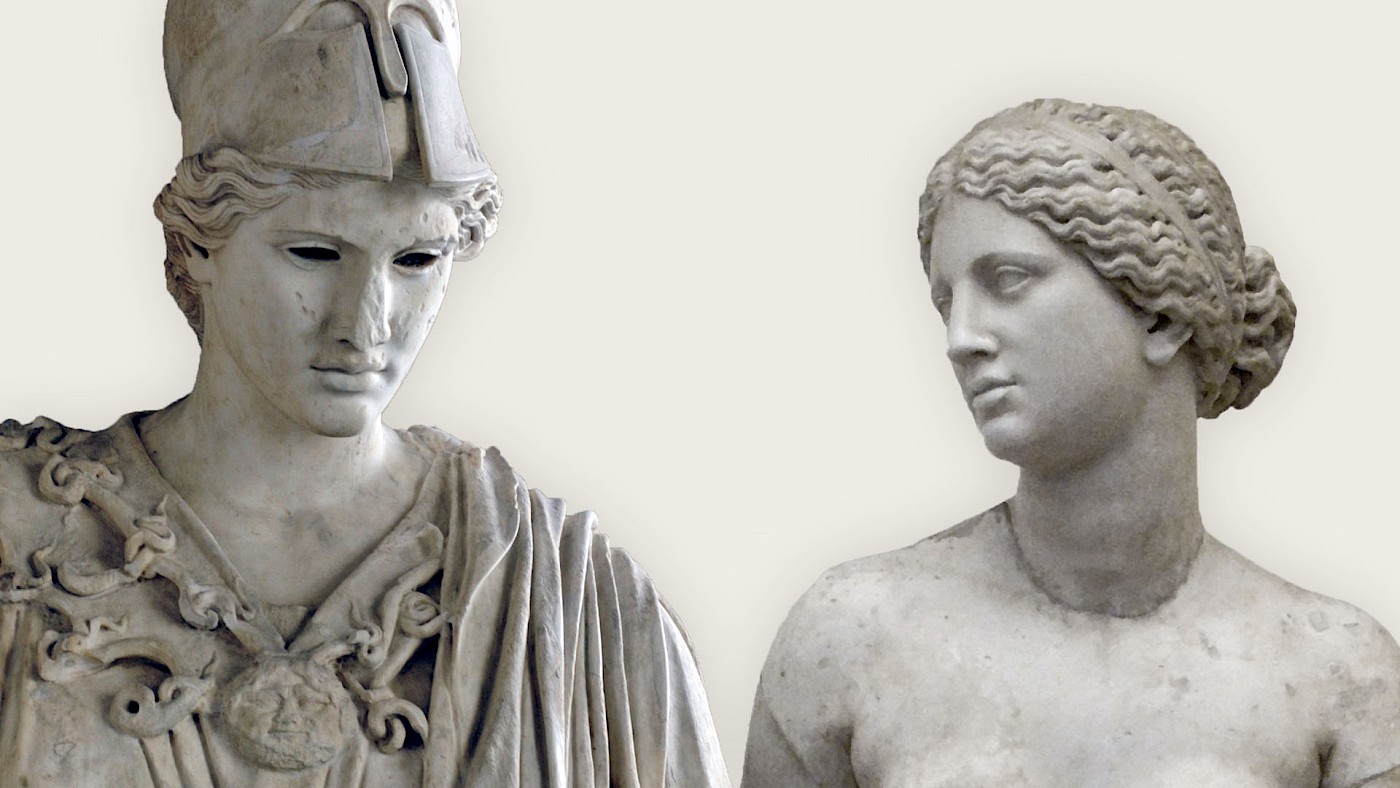In a piece that I recently wrote for this website, I discussed the short fight between Diomedes and Aeneas during the siege of Troy and its depiction on an Etruscan black figure amphora from Vulci. There is more to the story around that incident, however, and from it we get a rather negative view of a deity who is usually received positively in the modern world.
My previous discussion left off with Aphrodite throwing her wounded son to Apollo so that he may be ferried off the battlefield. The goddess herself had just been slashed by the brutish blade of Diomedes’ brazen spear. From her hand began to flow ichor, the magical material that flowed through the gods in place of blood. She recoiled and backed down from the charging Greek, feeling faint from the pain.
At this sight, Diomedes taunted her (Hom. Il. 5.350-354; transl. from Robert Fitzgerald’s Oxford World’s Classics edition):
Oh give up war, give up
war and killing, goddess! Is it not enough
to break soft women down with coaxing lust?
Go haunting battle, will you? I can see you
shudder after this at the name of war!
Aphrodite’s escape was aided by Iris, a messenger goddess in Homer’s mythology. Wanting to get clear away from the cursed Dardanian plain, she found her brother Ares nearby and was given his chariot on which to return to Olympus.
Here, she sought comfort and healing from her mother, Dione. She proceeded to tell her what had happened in front of the walls of Ilios, complaining of the “insolence” of Diomedes in wounding her when she was only trying to save her son from the war. Memorably, she extends the grievance against her to believing that “it seems this horrid combat is no longer Trojans against Achaeans – now, the Argives are making war upon the gods themselves!”
While this is probably an overstatement, the outrage that she is feeling is probably warranted. Diomedes intentionally attacked her, knowing her divinity, thinking it justifiable because she was not a goddess of war but one who inspires lust in women. He was not the only one to deride her nature, though.
Despite Dione’s comforting, Aphrodite did not find much solace on Olympus. Her half-sister Athena, traditionally the patron of wisdom (amongst other things) continued where the Argive prig had left off. She sarcastically asks their father, Zeus, if he would “be annoyed” if she made a “small comment” on the matter. After which she continued (Hom. Il. 5.424-428):
Aphrodite
likes to beguile the women of Achaea
to elope with Trojans, whom she so adores:
now, fondling some Achaean girl, I fear,
she scratched her slim white hand on a golden pin.
This is an unabashed example of what I think we would call today slut-shaming, one of countless examples known from antiquity. The implication is obvious: that war is a noble pursuit whilst the games of love and sex were for the weak and pale. Athena’s claim that to someone like her half-sister, unaccustomed to war, a pin-prick would seem like the slashing of a spear, is equally pejorative towards those who prefer a life of lust and love to fury and destruction. It should be noted that Athena gave Diomedes permission to attack Aphrodite, the only deity which she allows him to (Hom. Il. 5.129-132, cf. S. Deacy, “Athena and Ares: War, violence and warlike deities,” in H. van Wees (ed.), War and Violence in Ancient Greece (2000)).
Finding no fatherly protection afforded to her, Aphrodite is told by Zeus that “warfare is not for you, child. Lend yourself to sighs of longing and the marriage bed. Let Ares and Athena deal with war.” It seems that she can find no comfort besides that from her mother.
In these two encounters we find an early example of the Greek view towards female sexuality. While it was common to encourage the pursuits of men, allowing for overt sexual aggression towards all but married women, when it came to the latter it was frowned upon. Aphrodite, here, serves as an example of the perceived problems with women having lustful and emotional desires of their own. Aphrodite is in fact implicated in the flight of Helen to Troy, inspiring in her an insatiable passion.
This is simply one place where we find these kinds of opinions. But, of course, what is troubling here is that some of the harmful words come from the mouth of Athena, an otherwise level-headed goddess (as far as Greek deities go). Of course, the oral and literary heritage behind the Iliad was principally crafted by elite males, whose agendas are not hidden behind the poem’s winged words.
